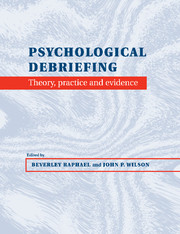Book contents
- Frontmatter
- Contents
- List of contributors
- Introduction and overview: Key issues in the conceptualization of debriefing
- Part I Key conceptual framework of debriefing
- Part II Debriefing: models, research and practice
- 5 Critical Incident Stress Management and Critical Incident Stress debriefings: evolutions, effects and outcomes
- 6 Debriefing with emergency services: Critical Incident Stress Management
- 7 Debriefing and body recovery: war grave soldiers
- 8 Debriefing and body recovery: police in a civilian disaster
- 9 Debriefing after massive road trauma: perceptions and outcomes
- 10 Debriefing and motor vehicle accidents: interventions and outcomes
- 11 Debriefing with service personnel in war and peace roles: experience and outcomes
- 12 Debriefing post disaster: follow-up after a major earthquake
- 13 Debriefing after disaster
- 14 Children and debriefing: theory, interventions and outcomes
- 15 Debriefing adolescents after critical life events
- Part III Adaptations of debriefing models
- Part IV Debriefing overview and future directions
- Conclusion: debriefing – science, belief and wisdom
- Index
13 - Debriefing after disaster
from Part II - Debriefing: models, research and practice
Published online by Cambridge University Press: 06 January 2010
- Frontmatter
- Contents
- List of contributors
- Introduction and overview: Key issues in the conceptualization of debriefing
- Part I Key conceptual framework of debriefing
- Part II Debriefing: models, research and practice
- 5 Critical Incident Stress Management and Critical Incident Stress debriefings: evolutions, effects and outcomes
- 6 Debriefing with emergency services: Critical Incident Stress Management
- 7 Debriefing and body recovery: war grave soldiers
- 8 Debriefing and body recovery: police in a civilian disaster
- 9 Debriefing after massive road trauma: perceptions and outcomes
- 10 Debriefing and motor vehicle accidents: interventions and outcomes
- 11 Debriefing with service personnel in war and peace roles: experience and outcomes
- 12 Debriefing post disaster: follow-up after a major earthquake
- 13 Debriefing after disaster
- 14 Children and debriefing: theory, interventions and outcomes
- 15 Debriefing adolescents after critical life events
- Part III Adaptations of debriefing models
- Part IV Debriefing overview and future directions
- Conclusion: debriefing – science, belief and wisdom
- Index
Summary
EDITORIAL COMMENTS
Lundin reviews some of the studies that show the potential impact of disaster stress on disaster workers, rescue workers and others. These lead to conclusions about the need to try to address or mitigate any such effects. ‘Debriefing’ has been widely applied but rarely researched or examined systematically in terms of the changes that such an intervention might induce in populations of rescuers to whom it is provided.
In examining research studies from widely differing disasters such as the Armenian earthquake, the Estonia ferry disaster, and of Swedish NATO soldiers in Bosnia, the author shows that traumatic stress symptoms decrease over time, but that this may not be able to be related to debriefing. Degrees of preparation, training and previous experience may be more significant, as may ‘professional’ as compared with ‘non-professional’ roles. The enormous difficulties in identifying the influence of particular factors, including specific interventions, is highlighted in this research. However, it is of interest to note that with the largest number of subjects (Swedish NATO soldiers), peer support plus post-incident defusing had the most positive effect on mental health whereas peer support alone, or peer support followed by defusing and debriefing, had no better effect than no support at all, another finding indicating caution about debriefing. The author also comments on the importance of interventions being ‘owned’ by the system and suggests that the research questions and evaluation framework should be set up as a ‘we’ project, as should be debriefing. If this occurs, the research itself may also serve therapeutic or debriefing ends.
- Type
- Chapter
- Information
- Psychological DebriefingTheory, Practice and Evidence, pp. 182 - 194Publisher: Cambridge University PressPrint publication year: 2000
- 2
- Cited by

